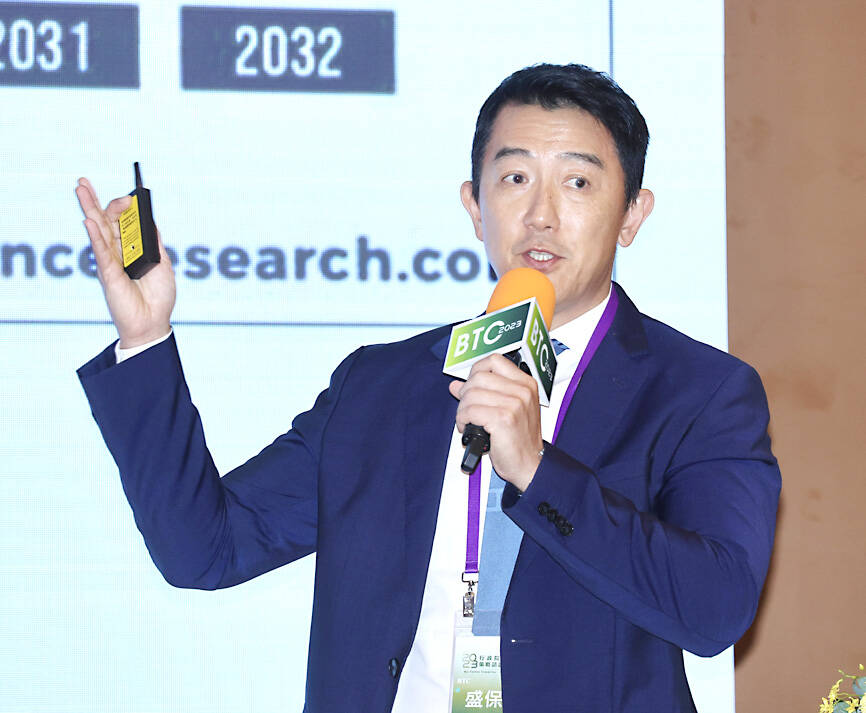Bora Pharmaceuticals Co (保瑞藥業) is still looking at contract development and manufacturing organizations (CDMOs) as potential merger and acquisition (M&A) targets, as the company continues to expand its business scale, the medicine and healthcare product maker said yesterday.
The company has seen its market value surge by more than 50-fold in seven years through a series of strategic M&As, including acquiring Japan-based Eisai Co’s subsidiary and plant in Tainan’s Guantian District (官田) in 2013 and US-based Impax Laboratories Inc’s subsidiary and plant in Miaoli County’s Jhunan Township (竹南) in 2018.
“We expect to see new M&A opportunities emerge next year,” Chinese-language online news outlet Cnyes.com quoted Bora Pharmaceuticals chairman Bobby Sheng (盛保熙) as saying. “There are not many buyers in the US M&A market and the valuations of many CDMOs are much cheaper than before, which is relatively beneficial to us.”

Photo: CNA
Sheng made the remarks at a ceremony at the Taiwan Stock Exchange (TWSE), where the company made its share debut on the main board after transferring its listing from the Taipei Exchange.
Bora Pharmaceuticals shares fell 3.1 percent to close at NT$657, in line with losses across the main exchange. Prior to yesterday, the stock had surged more than 60 percent since the beginning of this year.
Due to the growing market demand for drugs, several major clients have already discussed placing more orders, Bora Pharmaceuticals said.
As a result, the company has furthered its acquisition efforts, including factories, companies and product portfolios, it said.
It would also continue to adjust product strategy at its subsidiary TWi Pharmaceuticals Inc (安成藥) in a bid to diversify away from generic drugs, after the unit in August acquired six brand product licenses and technologies from Morristown, New Jersey-based Almatica Pharma Inc, it said.
The new strategy would enable Bora to leverage its sales platforms to enter the brand product market, create a new revenue driver and improve its profit margin, as well as allow the company to have more resources for future investment, it said.
Bora Pharmaceuticals’ consolidated revenue grew 50.25 percent year-on-year to NT$13.25 billion (US$422.5 million) in the first 11 months of this year, ranking second among Taiwanese pharmaceutical companies, TWSE data showed.
Net profit in the first three quarters totaled NT$2.47 billion, up 149.43 percent from the same period last year, with earnings per share rising from NT$10.12 to NT$24.63 and gross margin improving from 35.02 percent to 48.16 percent, the data showed.

Nvidia Corp chief executive officer Jensen Huang (黃仁勳) on Monday introduced the company’s latest supercomputer platform, featuring six new chips made by Taiwan Semiconductor Manufacturing Co (TSMC, 台積電), saying that it is now “in full production.” “If Vera Rubin is going to be in time for this year, it must be in production by now, and so, today I can tell you that Vera Rubin is in full production,” Huang said during his keynote speech at CES in Las Vegas. The rollout of six concurrent chips for Vera Rubin — the company’s next-generation artificial intelligence (AI) computing platform — marks a strategic

REVENUE PERFORMANCE: Cloud and network products, and electronic components saw strong increases, while smart consumer electronics and computing products fell Hon Hai Precision Industry Co (鴻海精密) yesterday posted 26.51 percent quarterly growth in revenue for last quarter to NT$2.6 trillion (US$82.44 billion), the strongest on record for the period and above expectations, but the company forecast a slight revenue dip this quarter due to seasonal factors. On an annual basis, revenue last quarter grew 22.07 percent, the company said. Analysts on average estimated about NT$2.4 trillion increase. Hon Hai, which assembles servers for Nvidia Corp and iPhones for Apple Inc, is expanding its capacity in the US, adding artificial intelligence (AI) server production in Wisconsin and Texas, where it operates established campuses. This

US President Donald Trump on Friday blocked US photonics firm HieFo Corp’s US$3 million acquisition of assets in New Jersey-based aerospace and defense specialist Emcore Corp, citing national security and China-related concerns. In an order released by the White House, Trump said HieFo was “controlled by a citizen of the People’s Republic of China” and that its 2024 acquisition of Emcore’s businesses led the US president to believe that it might “take action that threatens to impair the national security of the United States.” The order did not name the person or detail Trump’s concerns. “The Transaction is hereby prohibited,”

Garment maker Makalot Industrial Co (聚陽) yesterday reported lower-than-expected fourth-quarter revenue of NT$7.93 billion (US$251.44 million), down 9.48 percent from NT$8.76 billion a year earlier. On a quarterly basis, revenue fell 10.83 percent from NT$8.89 billion, company data showed. The figure was also lower than market expectations of NT$8.05 billion, according to data compiled by Yuanta Securities Investment and Consulting Co (元大投顧), which had projected NT$8.22 billion. Makalot’s revenue this quarter would likely increase by a mid-teens percentage as the industry is entering its high season, Yuanta said. Overall, Makalot’s revenue last year totaled NT$34.43 billion, down 3.08 percent from its record NT$35.52